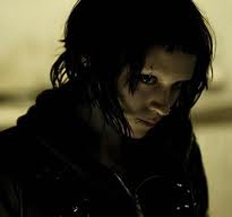 David Fincher’s tense, moody film adaptation of the popular Stieg Larsson book actually improves on the reading experience. Where the book offered a great story with plodding prose, Fincher’s film cuts the narrative to the bone while staying faithful to Larsson’s plot and characters. The film’s visual style makes it a pleasure to watch, evoking both the cosmopolitanism and gritty urbanism of Stockholm and the frozen, snow-blown north Sweden countryside where much of the central mystery unravels.
David Fincher’s tense, moody film adaptation of the popular Stieg Larsson book actually improves on the reading experience. Where the book offered a great story with plodding prose, Fincher’s film cuts the narrative to the bone while staying faithful to Larsson’s plot and characters. The film’s visual style makes it a pleasure to watch, evoking both the cosmopolitanism and gritty urbanism of Stockholm and the frozen, snow-blown north Sweden countryside where much of the central mystery unravels.
For a film that’s in large part about an ace computer hacker, Fincher both downplays and makes visually interesting Lisbeth Salander’s notorious skills, intercutting shots of her snub-nailed fingers flying over her keyboard with those of her intense gray eyes, replete with eyebrow-piercings, peering intensely at the screen. Only sparingly does Fincher use screen shots that indicate she’s reading other people’s email.
The film is a huge improvement over the Swedish version released a few years ago and starring Noomi Rapace as Lisbeth, which I found a more literal, bloodless adaptation. Fincher’s slick Hollywood idioms turn the story into a stylish, fast-paced thriller. In the opening credits (as other critics have noted), the director nods both musically and visually to the iconic James Bond films, a nice intertextual reference, since Fincher’s Mikael Blomkvist is played by Daniel Craig, the latest Bond.
Fincher also judiciously uses atmospheric, nearly Technicolor flashbacks to the Vanger family’s 1960s history, when the family patriarch’s treasured niece, Harriet, mysteriously disappeared. Fincher makes the American adaptation of Larsson’s story more vivid, lending cinematic appeal to the narrative while he moves it smoothly through its paces.
The real revelation in Fincher’s Girl with the Dragon Tattoo is Rooney Mara as Lisbeth Salander. Nominated for a Golden Globe (which she lost to Meryl Streep for The Iron Lady) and now for a Best Actress Academy Award, Mara deserves the accolades heaped on her performance. Her Lisbeth is slight but fierce; Mara seems both smaller and steelier than Rapace was in the role, more emotionally fragile but more physically and psychically determined.
In her early scenes in her kindly employer Dragan Armansky’s office (Goran Kisnjic, in a small but empathetic supporting role) and in her first meeting with Nils Bjurman (Vorick van Wageningen), her evil new guardian, Lisbeth refuses to make eye contact.
But when she does shift her gaze to look directly and defiantly at her interlocutors, you see a young woman who’s absolutely in control of her traumatic past (about which we learn very little in this first film of the trilogy). She’s taught herself a kind of discipline that keeps her highly functioning while letting her passion for vengeance simmer just underneath the surface of her skin. Those gray eyes become the swing door to a boiler room of the soul, where her rage is stoked by knowing that the social corruptions—most of them gendered—that have kept her a ward of the state since she was twelve continue to structure Swedish life.
On the other hand, if you don’t know her backstory, Lisbeth doesn’t necessarily seem motivated by revenge. My intrepid film-going companion, Feminist Spectator 2, hasn’t read any of the Larsson books, and found Lisbeth even more fierce and fascinating because she appears brilliant, scary, and tough without being psychologized.
Dragon Tattoo is, of course, just the first in what will be a new trilogy of films based on Larsson’s story. In this one, all we hear of Lisbeth’s past is what she mutters to Blomkvist when he’s finally gained her trust. When he asks her why she’s still a ward of the state, Lisbeth admits matter-of-factly that she’s considered criminally insane because she set her father on fire and burned 80 percent of his body. But since even this tiny, teasing revelation comes relatively late in the film, FS2 says spectators have already come to admire her without needing this justification.
Lisbeth’s sordid history will be fully explicated in the next two films. Mara, however, plays her with full knowledge of the character’s past and her journey into her vexed present. Mara’s achievement is to make Salander a fierce, even feminist, character without creating her as a monster. Sure, all her Goth accoutrements are in place, from her jet-black Mohawk to her kohl-lined eyes to her multiple facial and body piercings, along with her leather jacket, knapsack, boots, and green canvas cargo pants.
Lisbeth smokes like a tough, holding her cigarettes between her thumb and her forefinger and squinting at the ubiquitous smoke. She wears ratty black t-shirts and sweatshirts with hoods she pulls up to hide beneath. When Blomkvist barges in on Lisbeth and a one-night-stand she’s picked up at a lesbian bar, her tattered t-shirt reads “Fuck Off You Fucking Fuck” in faded stenciling. (But he’s undeterred.) Her neck is adorned with heavy chains and razor blades, the jewelry of a woman who refuses to submit.
[If you haven’t read Larsson’s books or seen the Swedish film trilogy or Fincher’s adaptation, spoilers follow.]
Although Lisbeth is a force to contend with, her new guardian decides he can use his power over her for his own nefarious sexual purposes. Bjurman forces her head into his lap at their first meeting, threatening to commit her to an institution if she doesn’t comply. When she sees him again, required to ask him for money since he’s taken control of her affairs, he rapes her brutally, sadistically enjoying the pain and humiliation he inflicts. But it doesn’t take long for Lisbeth to exact her revenge, forever reducing her rapist to a quaking eunuch.
To Fincher’s credit, the film doesn’t sensationalize Lisbeth. The other characters don’t react to her as though she’s a spectacle, undercutting what might be spectators’ expectations that she’ll create a stir simply by how she looks. Instead, lawyer, Dirch Frode (Steven Berkoff), dispatched by the wealthy Henrik Vanger (Christopher Plummer), treats Lisbeth respectfully, aware of her talent as a researcher and overlooking her open hostility.
Likewise, when Blomkvist peremptorily visits her apartment after he learns that she’s hacked into his computer, he, too, is unfazed by her unkempt appearance and aggressive demeanor. Instead, he insists that she drink the coffee and eat the breakfast he fixes for her while he persuades her to help him find Harriet Vanger’s murderer.
As FS2 points out, that the film’s “good” men react generously to Lisbeth directs spectators to see her magnanimously, too. On the other hand, FS2 continues, Mara is a beautiful young woman, and the camera exploits her small, perfect features, her flawless skin, and her clear gray eyes. That is, despite all her bravado and her frightening accessories, Fincher takes care to on some level glamorize Lisbeth, to keep her safe from the audience’s, as well as the other characters’, antipathy.
Even the police officers she approaches while she’s doing her work seem to find nothing remiss in Lisbeth’s outfit or her bearing. They worry that the information she wants will upset her or they’re annoyed because she expects unusual access and demands too much time. But they obviously don’t see her as a freak.
Nonetheless, she rides a mean motorcycle and wears a fearsome helmet. Lisbeth’s heroism comes from her character more than it does from her actions. When she forces the villainous Martin Vanger (Stellan Skarsgard) off the bridge on his family’s island, causing his car to overturn and catch fire as he stares out, doomed and helpless in the driver’s seat, Lisbeth watches without remorse.
And what a nice switch to see her rescue Blomkvist from certain death instead of vice versa. Too often in suspense films like Dragon Tattoo, it’s the woman—however intrepid and smart—who is saved at the end by the man when she finds herself unwittingly trapped in the villain’s house. InDrag Tattoo, on the contrary, at the film’s climactic moment it’s Craig/Bond/Blomkvist who is trussed up like a bird waiting to be plucked, and it’s Lisbeth whose eleventh hour appearance, wielding a nasty golf club, saves his life.
Lisbeth and Blomkvist simultaneously solve the central mystery of who has been murdering women—all gruesomely raped and slaughtered with references to Bible verses—around the time Harriet Vanger disappeared. But it’s Lisbeth who tracks the killer to his lair after Blomkvist falls into his trap, and Lisbeth who, once the demon is dispatched, goes on to vindicate Blomkvist’s wrongful slander conviction in the Wennerstrom corporate corruption case that sets Larsson’s plot in motion.
The Wennerstrom revenge subplot of Dragon Tattoo is nearly campy, as Lisbeth sheds her signature style for a Dolce and Gabbana look that one critic rightly called “drag.” She dons a blond wig and outsized sunglasses, a form-fitting dress and stiletto heels, to move some funds around various off-shore banks, creating a trail of financial malfeasance that bankrupts Wennerstrom, exonerates Blomkvist, and secures Lisbeth’s independent future.
In her drag scenes, Mara beautifully performs Lisbeth’s disdain for her temporary performance of conventional femininity. When her masquerade is over, she tosses her earrings down an airport sink and throws her wig out the window of a train. The sequence is a wonderful illustration of Lisbeth’s skill as an operative, but an even better demonstration of her utter aversion for traditional feminine costumes and behavior.
I was actually surprised that Fincher’s film leaves Lisbeth’s feminism so intact. I found Fincher’s representations of women in his film, The Social Network, misogynist. Those who disagreed with me often pointed to Mara’s character in that film; she plays Mark Zuckerberg’s smart and cutting but quickly dismissed and ultimately irrelevant girlfriend.
But while women were incidental sexual playthings in The Social Network, Dragon Tattoo is very much Lisbeth’s film. She’s its moral and narrative center and its keen social observer. Watch Mara’s ears and eyes perk up when Blomkvist invites her to help him find “a man who kills women” (which was apparently the title Larsson preferred for his first book).
Lisbeth is also the film’s most interesting character study, not because of how she looks and dresses but because of how she reacts to the world around her and then acts. Mara has little dialogue, but her expressive face and her physical commitment to Lisbeth make her fascinating. Watch her exit from the elevator where she excoriates the reprehensible Bjurman and leaves him terrified as the doors close behind her. Just turning her back on her guardian is a moment of utter command, clarity, and complexity.
Lisbeth/Mara also brings Dragon Tattoo a surprising sense of humor. When she begins working with Blomkvist, the couple hunch over his laptop in the cold cabin Henrik Vanger has provided for him. She rolls her eyes as Blomkvist slowly pecks at the keys to bring up screen images. It’s a small but hilarious moment, as Mara gives Lisbeth an interior life lets her drolly, wordlessly comment on her male partner’s technological inadequacies without needing to perform her superiority.
Lisbeth is firmly in control of their relationship. She initiates their first sexual encounter; she demands that he stop talking until she has her orgasm; she saves him from certain death; and she delivers the goods on Blomkvist’s nemesis, Hans-Erik Wennerstrom (Ulf Friberg), which restores Blomkvist’s reputation.
My quibbles with Fincher’s representation of Lisbeth are minor. For example, after she’s raped by Bjurman, she stumbles home for the de rigueur victim-in-the-shower scene, where we see her bruises and the blood running from her body into the tub. (I guess it’s difficult to signify pain in a film without these iconic signs. Although Mara does an excellent job screaming Lisbeth’s rage as she struggles against Bjurman’s restraints.) The next time we see her, Lisbeth is in a lesbian bar, where she picks up the (beautiful) woman who Blomkvist finds sharing her bed the next morning.
The juxtaposition of the rape and the lesbian bar scene makes it seem as though male sexual violence has propelled Lisbeth toward sex with women. Instead, in the book, she has an on-going relationship with a woman that mirrors Blomkvist’s relationship with his colleague, Erika Berger (Robin Wright), and clarifies that one of Lisbeth’s charms is her assertive bisexuality.
Likewise, Dragon Tattoo’s last several scenes focus too much on Lisbeth’s unexpected affection for Mikael. She tells her beloved former guardian, Holmer Palmgren (Bengt CW Carlsson), who’s in a nursing home recovering from a stroke, that she’s made a friend. She buys Blomkvist an expensive leather jacket and she rides off to deliver it to him.
Despite her strength of character and insight, Lisbeth is emotionally immature, and hasn’t picked up Blomkvist’s cues. So she’s devastated when she arrives at the Millennium magazine offices to find the flirtatious Mikael going off in a taxi with Erika. The film ends on Lisbeth’s romantic disappointment, which undercuts her earlier rejections of heterosexual femininity, especially for those spectators who haven’t read or seen the earlier version of the trilogy and don’t understand—as they say—where she’s coming from.
But still, Fincher and Mara make Lisbeth complicated enough. That final moment could be read as a strong woman realizing she was about to succumb to sentiment and abruptly choosing not to. (Well, maybe that’s a stretch). And Lisbeth does seem young. In comparison, Fincher portrays Blomkvist as squarely middle-aged, and steers Craig far from his Bond action hero routine. The actor sports an unshaven, grizzled salt-and-pepper chin throughout the film, and rather than leaping tall buildings and consulting cool gadgets, he’s often physically compromised.
For example, when he creeps around Martin’s glass-walled lair in the film’s climax, he’s the one who takes a kitchen knife from the counter, intending to defend himself as ineffectually as a typical female victim in a horror film. Blomkvist is the one who falls when he tries to run from Martin’s house and who is lured back in to the man’s trap. As Martin boasts with a sneer, people’s desire not to offend often trumps their instincts for self-preservation. (Skarsgard plays the villain with the perfect mix of unctuous obsequiousness and arrogant pride.)
Blomkvist is the first man who’s demonstrated this self-defeating instinct to Martin. Blomkvist is a metrosexual intellectual, a not quite effete representative of the fourth estate, and Craig plays him with intelligent bemusement and horror at the grisly murders his research uncovers. His black-rimmed glasses hang crookedly off his ears instead of over his head, and he pulls them onto his face to peer into documents and computer screens. Using eyeglasses to signify intelligence is a tired cliché, but Craig at least makes the gesture convincing.
Wright plays Blomkvist’s long-time friend and sometime bed-mate Erika as his intellectual and political companion. Wright’s beauty is only enhanced by the lines on her face. The middle-aged couple has a lived-in relationship, even though she remains married to her husband. Blomkvist and Erika are comfortably established in their lives, in contrast to Lisbeth, who’s still struggling with the tangled tendrils of her past.
Lisbeth’s relationship with Blomkvist might be a turning point. A scene in which they work together on the bed in a hotel room, with him in a white terry robe and her in her Goth outfit, is a nice moment of intimacy across clear differences. But she’s still testing new contours for her life, while his are indisputably firm.
It’s a shame, then, that the film’s ending makes Lisbeth seem a jilted lover, when her character is otherwise so compelling, strong and competent.
One last note: I’m surprised that critics and spectators refer so often to what they consider the film’s extreme violence and sexuality. While the rape scene is certainly horrific, Dragon Tattoo didn’t strike me as significantly more brutal than any other shoot-‘em up, set-‘em-on-fire action flick.
Does this film seem more extreme because its hero is a woman? Because Lisbeth neutralizes Bjurman with a stun gun and then tattoos “I am a rapist pig” across his naked stomach? Because it’s Martin, the male killer of women, who dies in a ball of fire? Or because it’s Daniel Craig who’s victimized and saved by a woman in the end? Just wondering.
The Feminist Spectator
Link to original post on Blogspot.
 Writer-director Alexander Payne’s films—if About Schmidt, Sideways, and now The Descendantsare any indication—are sensitive, expressive investigations into white, middle-class, heterosexual masculinity. George Clooney, recently nominated for an Academy Award for his role, for which he already won a Golden Globe, plays Matt King, a real estate lawyer in Hawai’i whose life falls apart when his wife’s injury in a boating accident leaves her in an irreversible coma. In the voiceover that frames much of the film, Matt admits that he’s always been the back-up parent to his two daughters, and can’t quite fathom what to do with his family when he’s left in charge.
Writer-director Alexander Payne’s films—if About Schmidt, Sideways, and now The Descendantsare any indication—are sensitive, expressive investigations into white, middle-class, heterosexual masculinity. George Clooney, recently nominated for an Academy Award for his role, for which he already won a Golden Globe, plays Matt King, a real estate lawyer in Hawai’i whose life falls apart when his wife’s injury in a boating accident leaves her in an irreversible coma. In the voiceover that frames much of the film, Matt admits that he’s always been the back-up parent to his two daughters, and can’t quite fathom what to do with his family when he’s left in charge.

 David Fincher’s tense, moody film adaptation of the popular Stieg Larsson book actually improves on the reading experience. Where the book offered a great story with plodding prose, Fincher’s film cuts the narrative to the bone while staying faithful to Larsson’s plot and characters. The film’s visual style makes it a pleasure to watch, evoking both the cosmopolitanism and gritty urbanism of Stockholm and the frozen, snow-blown north Sweden countryside where much of the central mystery unravels.
David Fincher’s tense, moody film adaptation of the popular Stieg Larsson book actually improves on the reading experience. Where the book offered a great story with plodding prose, Fincher’s film cuts the narrative to the bone while staying faithful to Larsson’s plot and characters. The film’s visual style makes it a pleasure to watch, evoking both the cosmopolitanism and gritty urbanism of Stockholm and the frozen, snow-blown north Sweden countryside where much of the central mystery unravels.
 Just a note to say that The Feminist Spectator blog won the
Just a note to say that The Feminist Spectator blog won the 
 I had the pleasure of seeing Codependent Lesbian Space Alien Seeks Same at the Galway Film Festival in Ireland last summer. It’s now playing through January 12 at ReRunGastropub Theatre in DUMBO (more info below).
I had the pleasure of seeing Codependent Lesbian Space Alien Seeks Same at the Galway Film Festival in Ireland last summer. It’s now playing through January 12 at ReRunGastropub Theatre in DUMBO (more info below).